|
|
|
Sort Order |
|
|
|
Items / Page
|
|
|
|
|
|
|
| Srl | Item |
| 1 |
ID:
110548
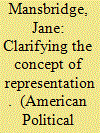

|
|
|
|
|
| Publication |
2011.
|
| Summary/Abstract |
This response to Andrew Rehfeld's "Representation Rethought" (American Political Science Review 2009) takes up his criticisms of my "Rethinking Representation" (American Political Science Review 2003) to advance a more relational and systematic approach to representation. To this end, it suggests replacing the "trustee" concept of representation with a "selection model" based on the selection and replacement of "gyroscopic" representatives who are both relatively self-reliant in judgment and relatively nonresponsive to sanctions. It explores as well the interaction between representatives' (and constituents') perceptions of reality and their normative views of what the representative ought to represent. Building from the concept of surrogate representation and other features of legislative representation, it argues for investigating, both normatively and empirically, not only the characteristics of individual representatives emphasized by Rehfeld's analysis but also the representative-constituent relationship and the larger representative system, including both elected and nonelected representatives, inside and outside the legislature.
|
|
|
|
|
|
|
|
|
|
|
|
|
|
|
|
| 2 |
ID:
110549
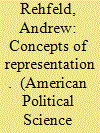

|
|
|
|
|
| Publication |
2011.
|
| Summary/Abstract |
In this reply to Jane Mansbridge's "Clarifying the Concept of Representation" in this issue (American Political Science Review 2011). I argue that our main disagreements are conceptual, and are traceable to the attempt to treat the concept of representation as a "single highly complex concept" as Hanna Pitkin once put it. Instead, I argue, it would be more useful to develop the various concepts that emphasize the underlying forms of representation. Against the view that empirical regularity should guide concept formation, I suggest that the failure to find instances of the cases I conceptualize is not itself a reason to reject them. Instead, I argue in favor of concepts that emphasize one side or other of a relationship, rather than treating both sides simultaneously, defending the view that "promissory" and "anticipatory" may usefully describe the activity of "representing" but ought to emphasize only one side of the representative-voter relationship. I also explain why adding substantive accounts of representation to any of Mansbridge's modifying concepts dilutes their practical value. I conclude by indicating the importance of developing concepts that stretch beyond the democratic contexts that feature prominently in her response.
|
|
|
|
|
|
|
|
|
|
|
|
|
|
|
|
| 3 |
ID:
110538


|
|
|
|
|
| Publication |
2011.
|
| Summary/Abstract |
A large literature in political science takes for granted that democratic leaders would pay substantial domestic political costs for failing to carry out the public threats they make in international crises, and consequently that making threats substantially enhances their leverage in crisis bargaining. And yet proponents of this audience costs theory have presented very little evidence that this causal mechanism actually operates in real-as opposed to simulated-crises. We look for such evidence in post-1945 crises and find hardly any. Audience cost mechanisms are rare because (1) leaders see unambiguously committing threats as imprudent, (2) domestic audiences care more about policy substance than about consistency between the leader's words and deeds, (3) domestic audiences care about their country's reputation for resolve and national honor independent of whether the leader has issued an explicit threat, and (4) authoritarian targets of democratic threats do not perceive audience costs dynamics in the same way that audience costs theorists do. We found domestic audience costs as secondary mechanisms in a few cases where the public already had hawkish preferences before any threats were made.
|
|
|
|
|
|
|
|
|
|
|
|
|
|
|
|
| 4 |
ID:
110539
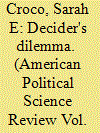

|
|
|
|
|
| Publication |
2011.
|
| Summary/Abstract |
A leader's culpability for involving his state in a conflict affects both his war termination calculus and his domestic audience's willingness to punish him if he loses. I define a culpable leader as any leader who either presides over the beginning of a war, or comes to power midwar and shares a political connection with a culpable predecessor. Using a data set created specifically for this study, I find that culpable leaders are more likely than nonculpable ones to achieve favorable war outcomes. I also find that domestic audiences will be willing to punish culpable leaders who lose, yet spare nonculpable leaders who do the same. Taken together, my findings underscore the need to appreciate more fully the role individual leaders play in bringing their states to war.
|
|
|
|
|
|
|
|
|
|
|
|
|
|
|
|
| 5 |
ID:
110542


|
|
|
|
|
| Publication |
2011.
|
| Summary/Abstract |
In committee deliberation, requiring a unanimous vote intuitively provides the strongest incentives for actors to share fully their opinions and private information. It is also believed that full revelation of (decision-relevant) information occurs when personal biases are made clear before deliberation. However, recent literature suggests that both intuitions are flawed. Austen-Smith and Feddersen propose a model in which the unanimity rule performs worse than other rules in promoting fully revealing deliberation, and uncertainty about individuals' preferences promotes full sharing of information. We extend this work by incorporating the possibility that individuals may provide verifiable evidence for their private information. Under this circumstance, we demonstrate that Austen-Smith and Feddersen's results are reversed. First, a unanimous voting rule performs better than any other, as unanimity is the only rule that always promotes fully revealing deliberation. Second, under fairly general conditions, uncertainty about individuals' preferences prevents full sharing of information.
|
|
|
|
|
|
|
|
|
|
|
|
|
|
|
|
| 6 |
ID:
110544
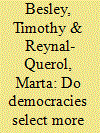

|
|
|
|
|
| Publication |
2011.
|
| Summary/Abstract |
This paper uses a unique data set on over 1,400 world leaders between 1848 and 2004 to investigate differences in educational qualifications between leaders who are selected in democracies and autocracies. After including country and year fixed effects, we find that democracies are around 20% more likely to select highly educated leaders. This finding is robust to a wide range of specifications, choices of subsamples, controls, and ways of measuring education and democracy.
|
|
|
|
|
|
|
|
|
|
|
|
|
|
|
|
| 7 |
ID:
110540


|
|
|
|
|
| Publication |
2011.
|
| Summary/Abstract |
Contemporary research on civil war has largely dismissed the role of political and economic grievances, focusing instead on opportunities for conflict. However, these strong claims rest on questionable theoretical and empirical grounds. Whereas scholars have examined primarily the relationship between individual inequality and conflict, we argue that horizontal inequalities between politically relevant ethnic groups and states at large can promote ethnonationalist conflict. Extending the empirical scope to the entire world, this article introduces a new spatial method that combines our newly geocoded data on ethnic groups' settlement areas with spatial wealth estimates. Based on these methodological advances, we find that, in highly unequal societies, both rich and poor groups fight more often than those groups whose wealth lies closer to the country average. Our results remain robust to a number of alternative sample definitions and specifications.
|
|
|
|
|
|
|
|
|
|
|
|
|
|
|
|
| 8 |
ID:
110543


|
|
|
|
|
| Publication |
2011.
|
| Summary/Abstract |
The development and elaboration of the spatial theory of voting has contributed greatly to the study of legislative decision making and elections. Statistical models that estimate the spatial locations of individual decision-makers have made a key contribution to this success. Spatial models have been estimated for the U.S. Congress, the Supreme Court, U.S. presidents, a large number of non-U.S. legislatures, and supranational organizations. Yet one potentially fruitful laboratory for testing spatial theories, the individual U.S. states, has remained relatively unexploited, for two reasons. First, state legislative roll call data have not yet been systematically collected for all states over time. Second, because ideal point models are based on latent scales, comparisons of ideal points across states or even between chambers within a state are difficult. This article reports substantial progress on both fronts. First, we have obtained the roll call voting data for all state legislatures from the mid-1990s onward. Second, we exploit a recurring survey of state legislative candidates to allow comparisons across time, chambers, and states as well as with the U.S. Congress. The resulting mapping of America's state legislatures has great potential to address numerous questions not only about state politics and policymaking, but also about legislative politics in general.
|
|
|
|
|
|
|
|
|
|
|
|
|
|
|
|
| 9 |
ID:
110547
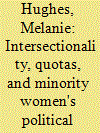

|
|
|
|
|
| Publication |
2011.
|
| Summary/Abstract |
The majority of the world's countries have implemented policies designed to advance the political representation of women and/or minority groups. Yet we do not yet understand how these disparate policies affect the election of minority women. In this article, I draw on theories of intersectionality to conduct the first worldwide analysis of the effects of gender and minority quotas on minority women's representation in national legislatures. Using hierarchical linear modeling, I analyze how quotas influence the election of women from more than 300 racial, ethnic, and religious groups across 81 countries. I find that policies designed to promote the political representation of women and minority groups interact to produce diverse but predictable outcomes for minority women. Although quotas are ostensibly designed to promote diversity and inclusiveness, the quota policies in effect today rarely challenge majority men's dominance of national legislatures.
|
|
|
|
|
|
|
|
|
|
|
|
|
|
|
|
| 10 |
ID:
110546


|
|
|
|
|
| Publication |
2011.
|
| Summary/Abstract |
Weak electoral registration requirements are commonly thought to encourage electoral participation, but may also promote electoral fraud. As one possibility, candidates and their supporters can more easily mobilize voters who do not reside within the district to register there fraudulently and vote for that district's candidates. We statistically detect this classic type of electoral fraud for the first time, by taking advantage of a natural experimental setting in Japanese municipal elections. We argue that whether or not a municipal election was held in April 2003 can be regarded as an "as-if" randomly assigned treatment. A differences-in-differences analysis of municipality-month panel data shows that the increase in the new population just prior to April 2003 is significantly larger in treatment municipalities (with an election) than in control ones (without an election). The estimated effects are decisive enough to change the electoral results when the election is competitive. We argue that our approach-"election timing as treatment"-can be applied to investigate not only this type of electoral fraud but also electoral connections in other countries.
|
|
|
|
|
|
|
|
|
|
|
|
|
|
|
|
| 11 |
ID:
110545


|
|
|
|
|
| Publication |
2011.
|
| Summary/Abstract |
Does control of patronage jobs significantly increase a political party's chances of winning elections in U.S. states? We employ a differences-in-differences design, exploiting the considerable variation in the dates that different states adopted civil service reforms. Our evidence suggests that political parties in U.S. states were able to use state-level patronage to increase the probability of maintaining control of state legislatures and statewide elective offices. We also find that an "entrenched" party, in power for a longer time, can use patronage more effectively. We consider several alternative hypotheses that might plausibly account for the patterns in the data, but find no evidence to support them.
|
|
|
|
|
|
|
|
|
|
|
|
|
|
|
|
|
|
|
|
|